How to Become an Investment Banker: A Guide
Investment banks are vital in the capital markets, acting as intermediaries between companies looking to raise capital and investors looking to invest.
Investment banking is a key sector within the BFSI (Banking, Financial Services, and Insurance) industry, providing advisory and financing services to corporations, governments, and institutions. The key functions of investment banks include underwriting new debt and equity securities, aiding in the sale of securities, and helping to facilitate mergers and acquisitions (M&A). Investment banks also guide on issuing and placing stock.
Major players in the industry include Goldman Sachs, JPMorgan Chase, and Morgan Stanley, which are renowned for their influential roles in shaping global financial markets. The industry is characterized by its high-stakes environment, demanding work hours, and significant financial rewards. According to industry data, the global investment banking revenue is projected to exceed $120 billion in 2024, reflecting the sector's immense growth and importance.
Investment banks are vital in the capital markets, acting as intermediaries between companies looking to raise capital and investors looking to invest. They play a key role in determining the prices of new securities in primary markets and providing liquidity in secondary markets.
In this blogpost:
- What is an investment banker?
- Necessary qualifications for an investment banker
- Skills of an investment banker
- Average salary of an investment banker in India
- Who can become an investment banker?
- Interview questions for investment bankers
What is an Investment Banker?
An investment banker specializes in the creation of capital for companies, governments, and other entities. They play a critical role in various financial transactions and advisory services. Here are the key responsibilities and functions of an investment banker:
Key Responsibilities and Functions
- Underwriting and Issuance of Securities: Investment bankers help companies and governments raise money by issuing stocks and bonds. They underwrite these securities, meaning they buy them from the issuer and sell them to investors at a profit.
- Mergers and Acquisitions (M&A): They advise companies on mergers, acquisitions, and divestitures. This includes identifying potential targets, negotiating terms, and structuring deals.
- Advisory Services: Investment bankers provide strategic advice to their clients on a wide range of financial matters, including valuations, capital structure, and risk management.
- Research and Analysis: Conducting detailed financial analysis and market research to provide insights and recommendations for investment opportunities and corporate strategies.
- Trading and Sales: Although more specific to certain departments within investment banks, they may be involved in the trading of securities and commodities, as well as sales activities to institutional and retail clients.
Necessary Qualifications for an Investment Banker
To start a career in investment banking, certain qualifications and skills are essential:
Educational Background:
- Undergraduate Degree: Most investment bankers have a bachelor's degree in finance, economics, business, or a related field. Degrees from prestigious institutions often carry more weight.
- MBA or Advanced Degrees: An MBA from a top business school can significantly enhance your career prospects. Advanced degrees in finance, law, or related disciplines are also valuable.
Certifications:
- Chartered Financial Analyst (CFA): This certification is highly regarded and demonstrates expertise in investment management.
- Financial Industry Regulatory Authority (FINRA) Licenses: Depending on the region, licenses such as the Series 7 and Series 79 may be required.
Internships
Gaining practical experience through internships at investment banks or financial institutions is crucial. These opportunities provide hands-on experience and can often lead to full-time job offers.
Skills of an investment banker
Apart from your qualifications and educational background, a strong and varied skill set can set the tone for you to be a successful investment banker. Develop or hone the following skills throughout your career:
Networking and interpersonal skills
An investment banker knows how to form connections with others across different cultures, industries and backgrounds and understands its importance. Interpersonal and networking skills can help you manage client relationships, recruit new customers, and handle challenging situations effectively while still maintaining a positive reputation. Connections established through strong networking and interpersonal skills may also lead to future job opportunities.
Communication Skills
Investment banking often involves complex financial terminology, making strong oral and written communication skills essential. These skills enable you to simplify and explain intricate concepts, such as risk assessments and financial regulations, to clients who may not be familiar with them. Whether leading a meeting, presenting data, or drafting financial documents, effective communication ensures that your ideas and expertise are conveyed clearly, ultimately serving your clients better. Additionally, the ability to persuade others is critical to successful communication in investment banking.
Leadership and Management Skills
Even in entry-level positions, leadership and management skills are vital for managing accounts and clients effectively. Developing these skills early in your career can lead to professional growth, including job promotions, salary increases, and other career opportunities. You can enhance these skills by taking courses in leadership and management or participating in professional development programs offered by your company.
Cognitive Skills
As an investment banker, staying informed about international events, business news, and other factors influencing investments is crucial. Strong cognitive skills enable you to assess how worldwide events, such as new government regulations or political changes, might impact investments. For instance, changes in trade agreements or import/export taxes due to political cycles can affect a company's revenue. Even at the entry-level, investment bankers are responsible for leading projects, assessing risks, and advising clients, making cognitive skills essential.
Other skills of an investment banker
Here are other valuable skills to have as an investment banker:
- Computer proficiency
- Foreign language fluency
- Innovation and creative thinking
- Numerical and data analysis
- Analytical and critical thinking
- Diversity and cultural awareness
- Self-discipline and motivation
Average Salary of Investment Banker in India
The average salary for an investment banker in India is INR 9.61 lakh per year, with a range from INR 2.46 lakh to INR 70 lakh per annum, including shared profits and bonuses. Over the past few years, the demand for investment bankers has surged as companies increasingly require assistance in raising funds and capital for their projects. With a growing investor base in the country, experienced investment bankers have become highly sought after in the Indian financial industry.
In the first half of the 2019 calendar year, Indian investment banking activities generated $523 million in fees, reflecting a 10.8% increase from the previous year. By the first half of 2023, these activities produced $515.2 million, marking a 17% increase from the first quarter of 2022.
Who Can Become an Investment Banker?
Becoming an investment banker is a highly competitive process. While the path is challenging, it is accessible to individuals who meet the following criteria:
- Educational Background: Strong academic performance in relevant fields such as finance, economics, or business from reputable institutions.
- Professional Experience: Internships or work experience in financial services, consulting, or related fields.
- Personal Traits: Resilience, attention to detail, strong communication skills, and the ability to thrive under pressure.
- Networking: Building connections within the industry can provide valuable opportunities and insights.
- Geographical Flexibility: Willingness to relocate to major financial hubs like New York, London, or Hong Kong.
Investment banking is open to individuals from diverse backgrounds, as long as they possess the necessary qualifications and skills. However, it is essential to be aware of the high level of competition and the rigorous selection process.
Interview Questions for Investment Bankers
Investment banking interviews are notoriously rigorous, often encompassing technical, behavioral, and situational questions. Here are some common questions you might encounter:
Technical Questions
Valuation Techniques:
- Can you walk me through a discounted cash flow (DCF) analysis?
- How do you value a company using the comparable companies’ method?
Financial Statements:
- How do the three financial statements link together?
- What are the key components of a cash flow statement?
Market Trends:
- What are the current trends in the investment banking industry?
- How do changes in interest rates impact investment banking activities?
Behavioural Questions
Teamwork:
- Can you describe a time when you worked effectively in a team?
- How do you handle conflicts within a team?
Problem-Solving:
- Describe a situation where you had to solve a complex problem under pressure.
- How do you prioritize tasks when managing multiple deadlines?
Motivation:
- Why do you want to work in investment banking?
- What drives you to succeed in a high-pressure environment?
Situational Questions
Client Interaction:
- How would you handle a difficult client during a deal negotiation?
- Can you give an example of how you managed a client relationship?
Ethical Scenarios:
- What would you do if you discovered confidential information about a client?
- How would you respond if asked to do something that you believe is unethical?
Top Rated Investment Resumes on Resumod
Resume of Banking Relationship Manager
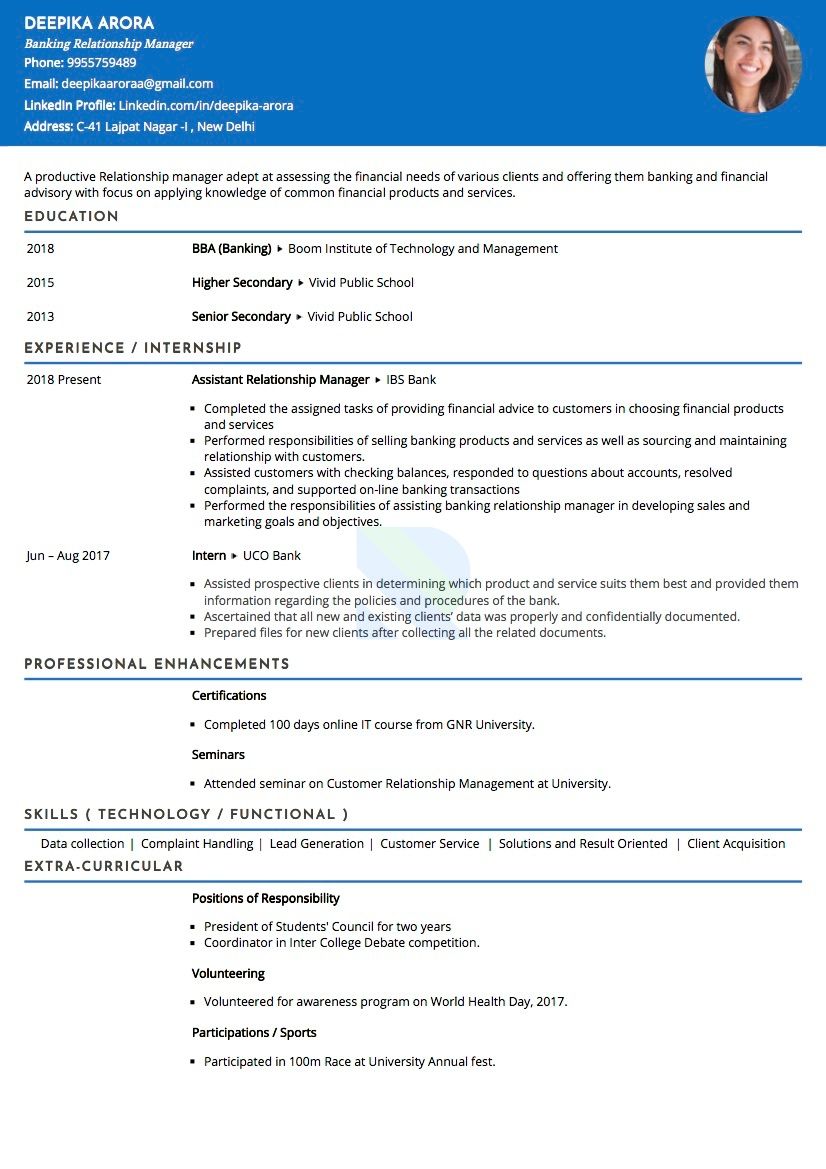
Check the full resume of banking relationship manager in text format here.
Resume of Hedge Fund Manager
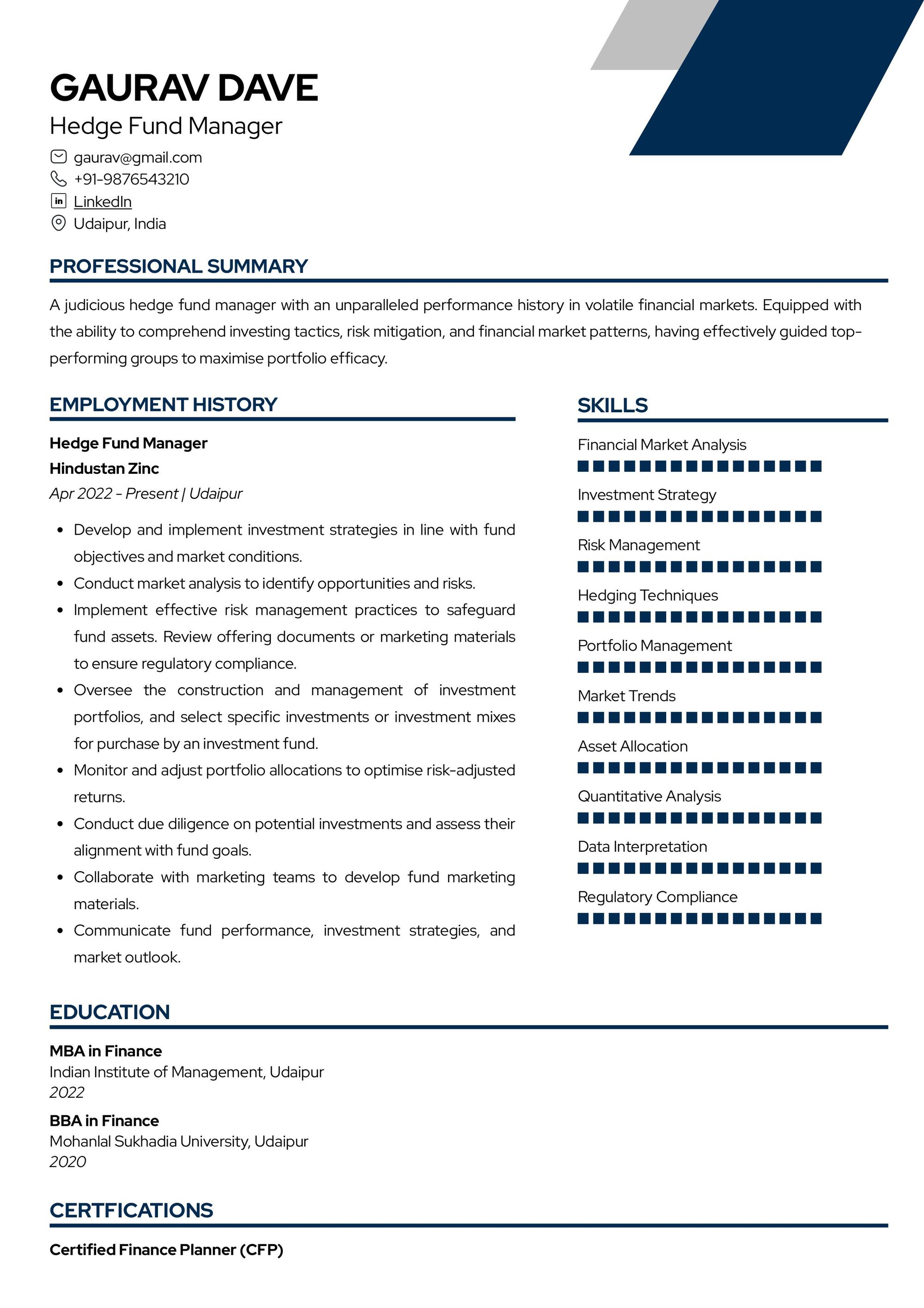
Check the full resume of hedge fund manager in text format here.
Resume of Finance Estimator
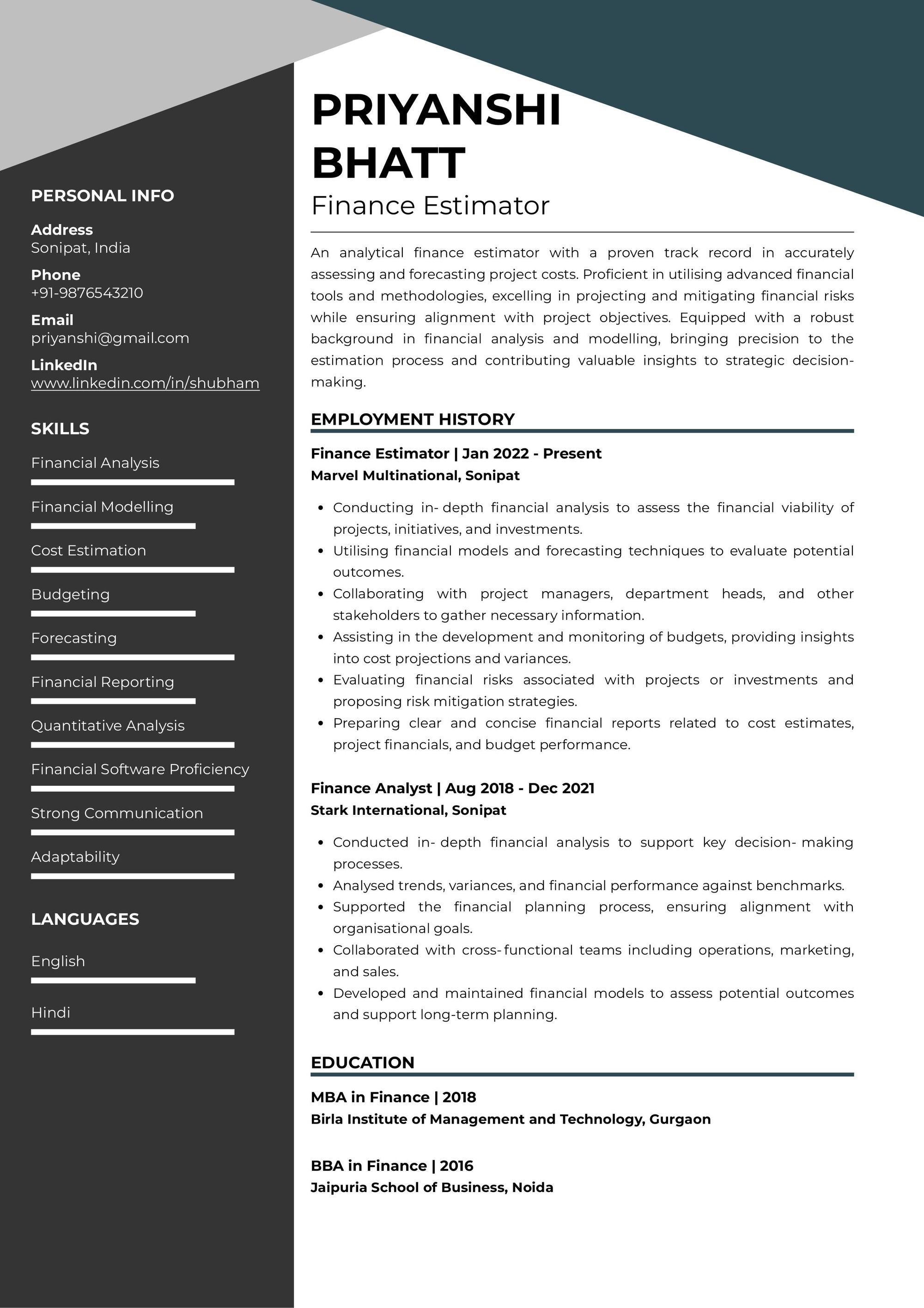
Check the full resume of finance estimator in text format here.
Resume of Bank Manager
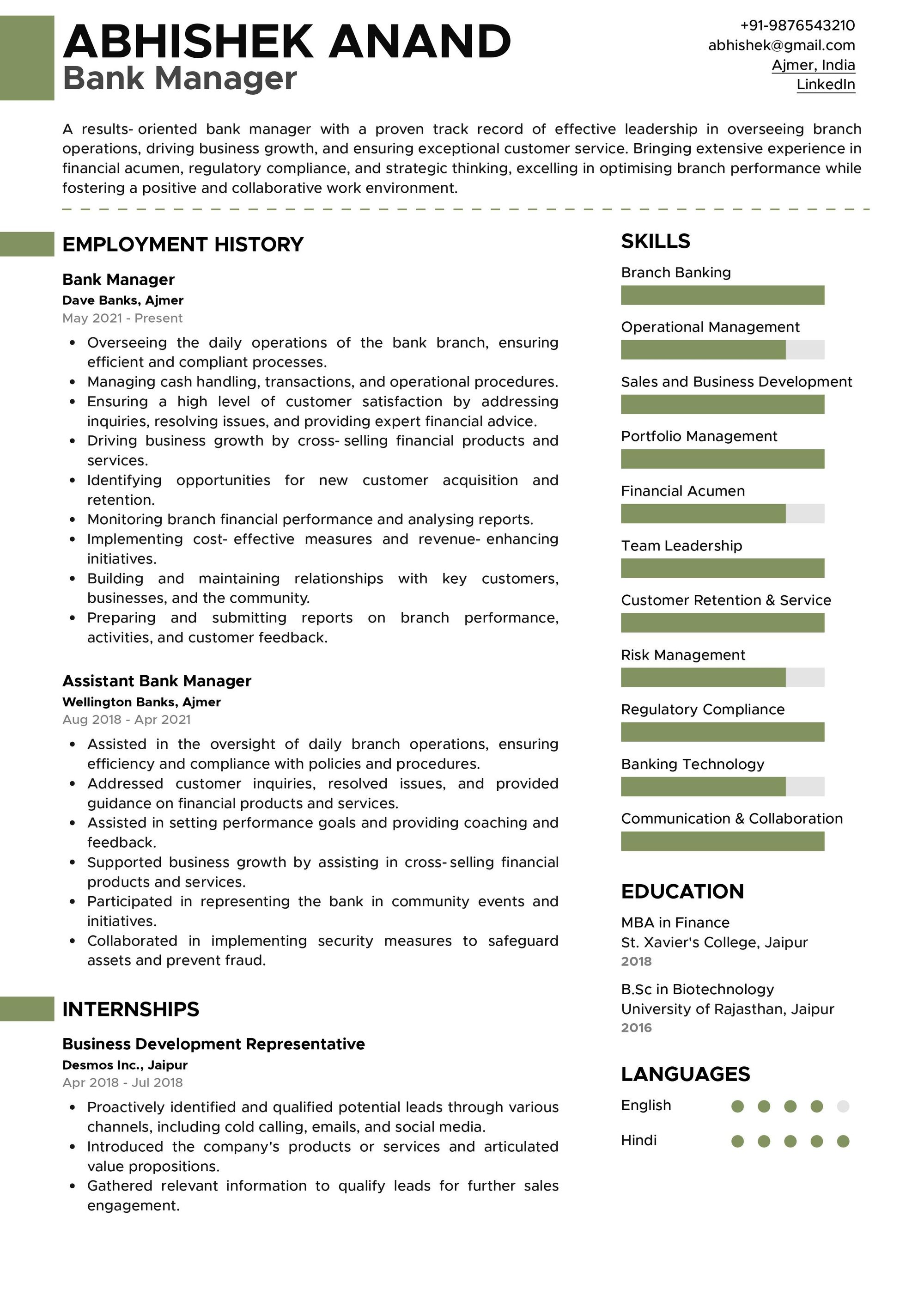
Check the full resume of bank manager in text format here.
Resume of Government and Financial Regulator
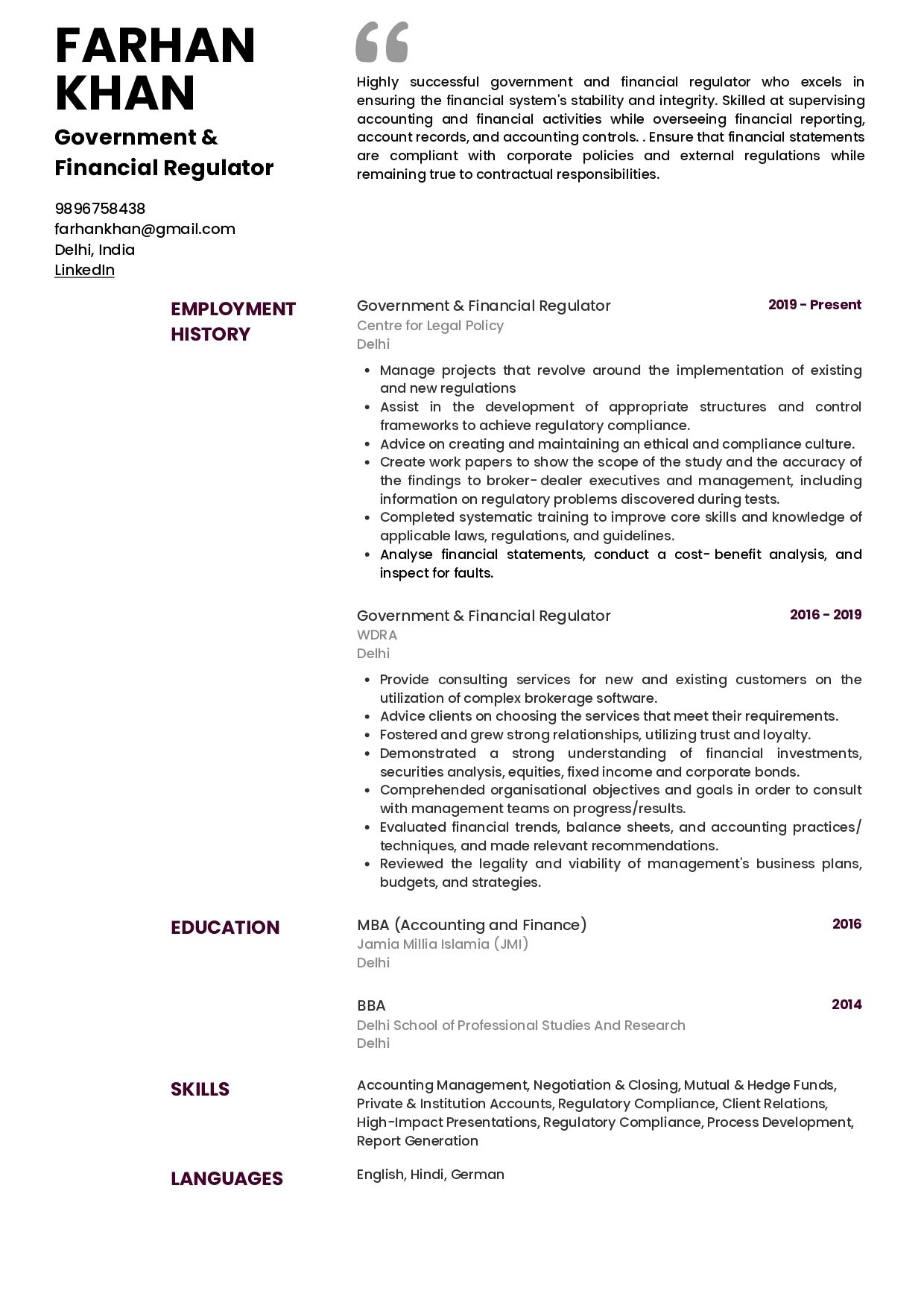
Check the full resume of government and financial regulator in text format here.
Resume Of Insurance Underwriter
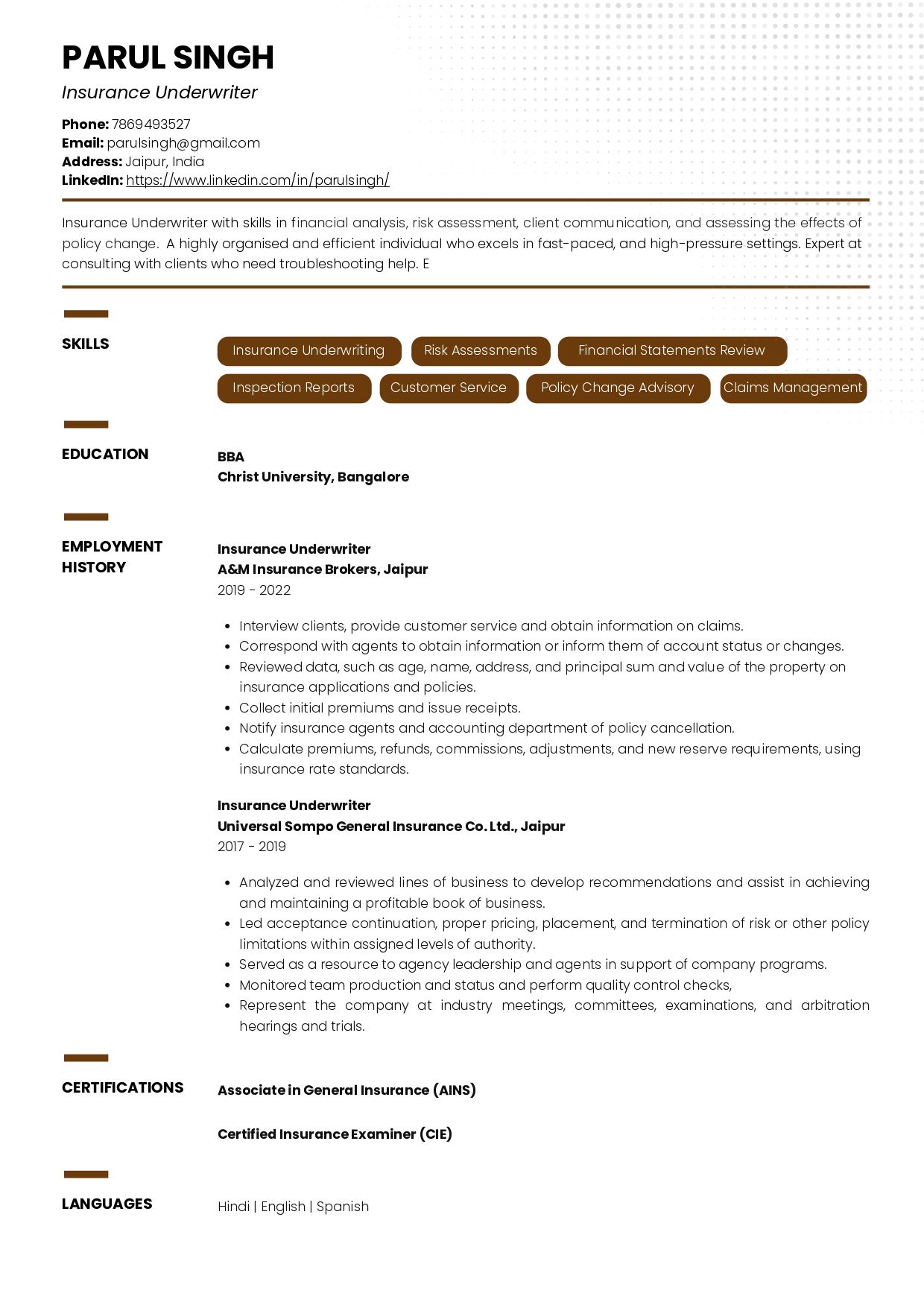
Check the full resume of insurance underwriter in text format here.
Resume of Branch Banking Professional
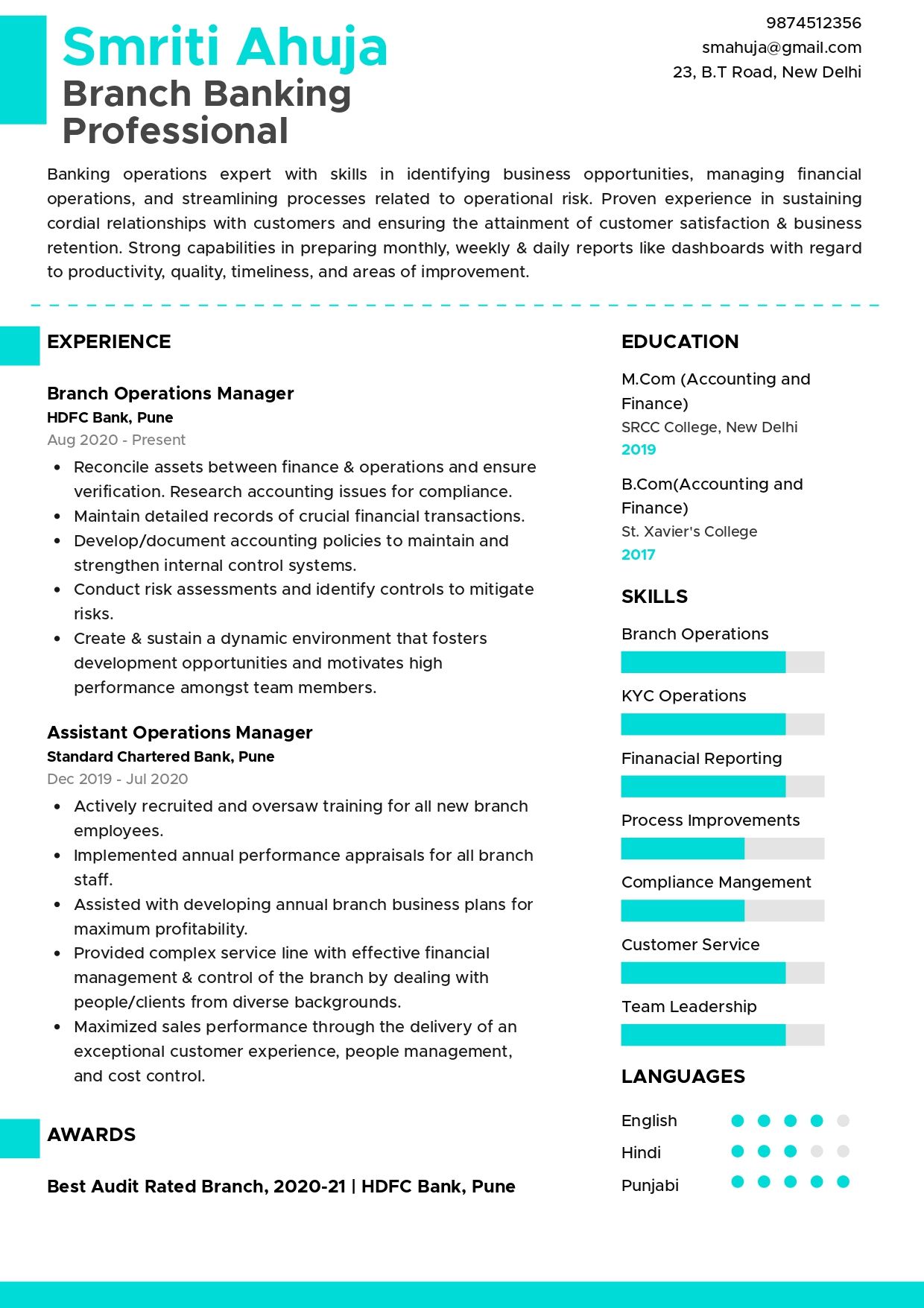
Check the full resume of branch banking professional in text format here.
Resume of Insurance Executive
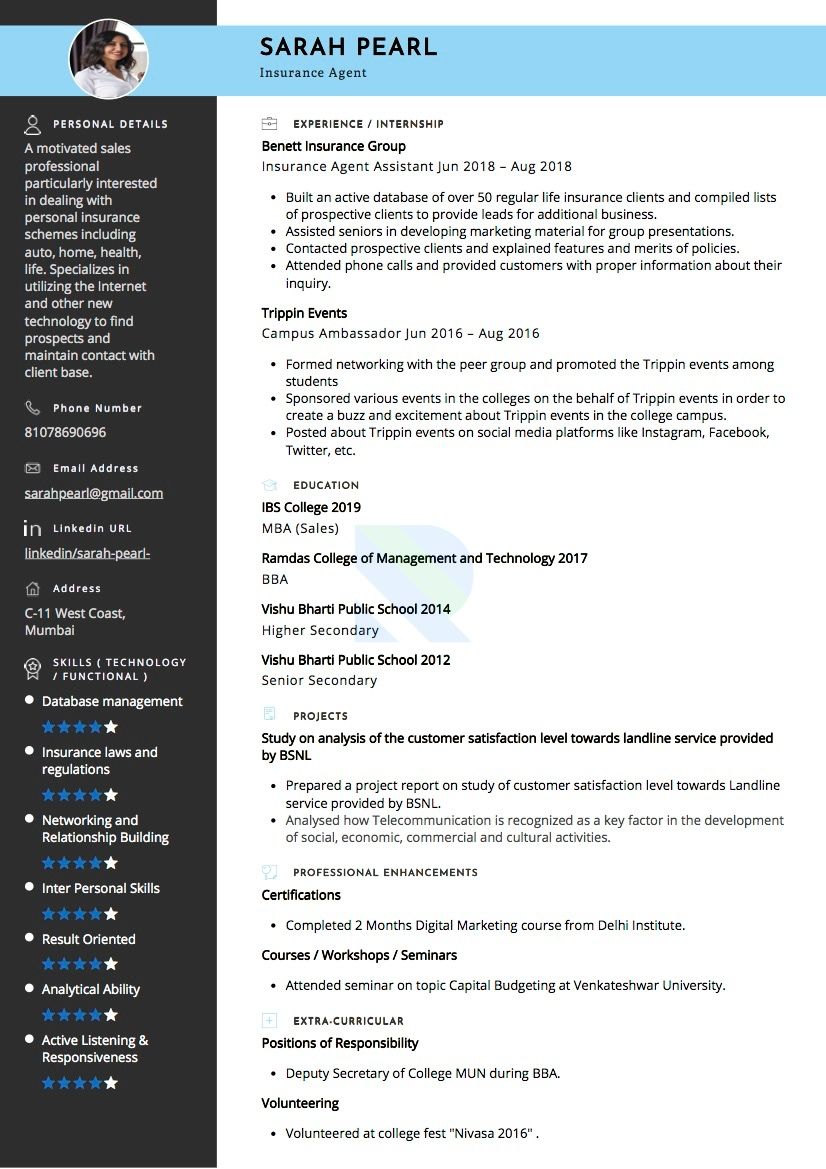
Check the full resume of insurance executive in text format here.
Resume of Institutional Banker
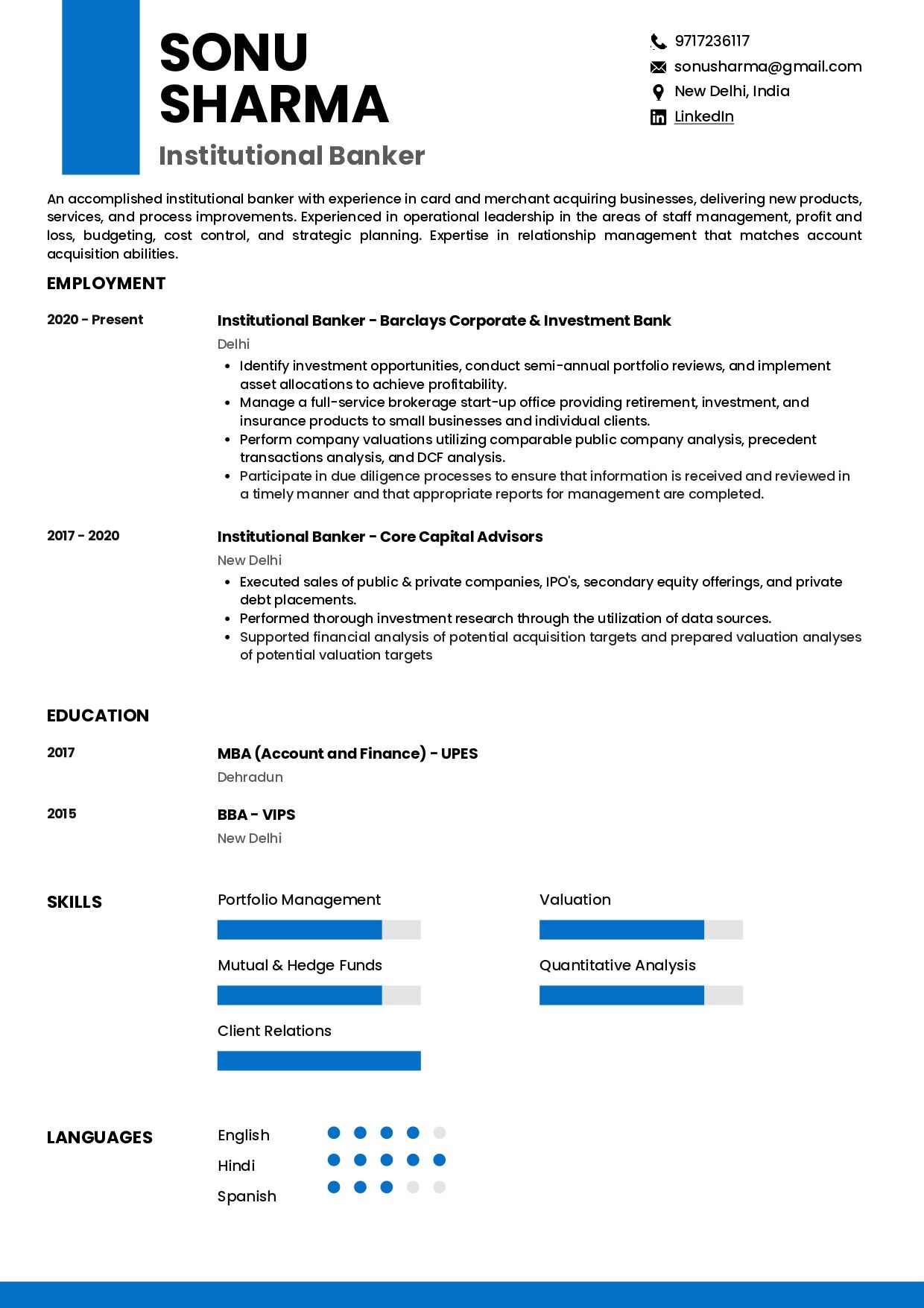
Check the full resume of institutional banker in text format here.
Resume of Investment Banker
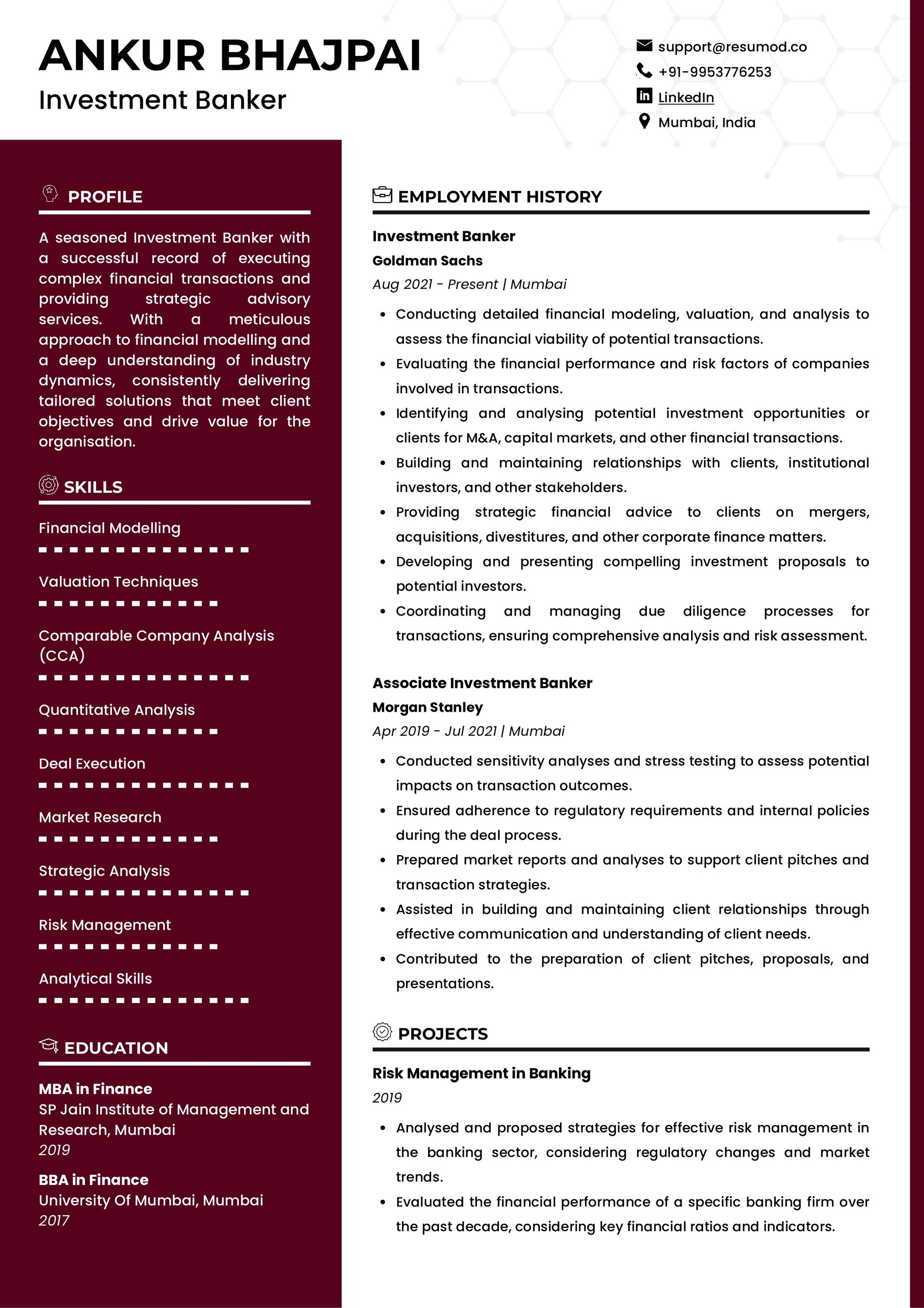
Check the full resume of investment banker in text format here.
Conclusion
Becoming an investment banker requires a combination of education, skills, and determination. The journey is challenging but offers immense rewards and opportunities for those who succeed. By understanding the industry, obtaining the necessary qualifications, and preparing thoroughly for interviews, you can pave your way to a successful career in investment banking. Remember, networking and gaining relevant experience through internships can significantly enhance your prospects. Stay informed about industry trends, continuously develop your skills, and remain resilient in the face of challenges. The path to becoming an investment banker is demanding, but with the right approach, it is an achievable and highly rewarding career choice.



